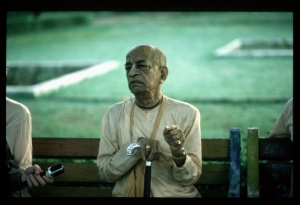CC Madhya 21.126 (1975)

A.C. Bhaktivedanta Swami Prabhupada
TEXT 126
- sakhī he, kṛṣṇa-mukha--dvija-rāja-rāja
- kṛṣṇa-vapu-siṁhāsane, vasi' rājya-śāsane,
- kare saṅge candrera samāja
SYNONYMS
sakhī he—O dear friend; kṛṣṇa-mukha—the face of Lord Kṛṣṇa; dvija-rāja-rāja—the king of moons; kṛṣṇa-vapu—of the transcendental body of Kṛṣṇa; siṁhāsane—on the throne; vasi'-sitting; rājya-śāsane—ruling of the kingdom; kare—does; saṅge—in the company of; candrera samāja—the society of moons.
TRANSLATION
"The face of Kṛṣṇa is the king of all moons, and the body of Kṛṣṇa is the throne. Thus the king governs a society of moons.
PURPORT
The entire face is called the king of moons. The mouth is another moon, the left cheek is a moon, and the right cheek is a moon. The spots of sandalwood pulp on Kṛṣṇa's face are also considered different moons, and His fingernails and toenails are also different moons. His forehead is considered a half moon, His face is considered the king of moons, and His body is considered the throne. All the other candras (moons) are considered to be subordinate moons.